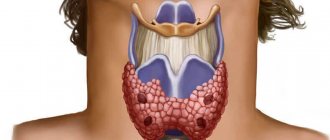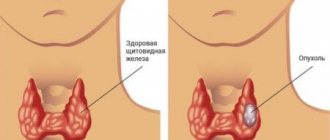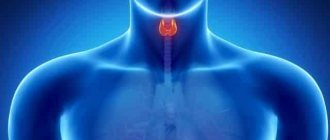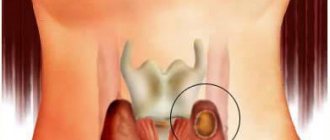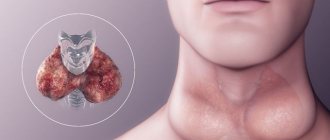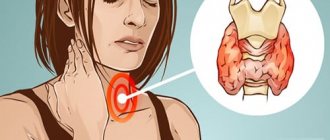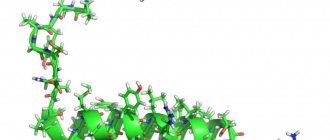Iodine is considered an essential vital trace element. Its participation in growth, development of the body, functioning of the nervous system and metabolism is extremely important, therefore the thyroid gland synthesizes special iodinated amino acids tyrosine, which are called thyroid hormones. These substances are the only iodinated hormones known to science.
The target tissues of thyroid hormones, that is, those parts of the body where the biochemical reaction takes place, are located almost throughout the body.
Correction of hormone functioning is carried out by the adenohypophysis using TSH.
Endocrine system hormones
The pituitary gland and hypothalamus are very important glands in the body.
They are interconnected, they regulate almost the entire endocrine system. Thyroid-stimulating hormone (known as thyrotropin, or TSH) is a pituitary hormone that stimulates the thyroid gland. Its production in the body is constant, especially active in the early morning.
The thyroid gland is the largest endocrine gland in humans. It is located in the front of the trachea (on the front of the neck), just below the thyroid cartilage, under the Adam's apple. The main functions of the thyroid gland are to maintain the body's metabolic rate and growth. It affects the quality of operation of all other systems, regulating all processes:
- respiratory functions;
- processes of eating, sleeping;
- movement functions;
- activity of the reproductive system;
- heartbeat.
All this happens because the thyroid hormones act: thyroxine (T4) and triiodothyronine (T3). They regulate metabolism in the body, metabolic rate, body temperature, and child growth.
T4 is converted to the active hormone triiodothyronine (T3). It stimulates metabolism.
Somatostatin is also produced by the hypothalamus. It has the opposite effect, decreasing TSH production.
The formation of TSH by the pituitary gland depends on the concentration of the hormones T3 and T4. If the levels of T3 and T4 are low, then the production of thyrotropin will increase, and if their concentration is high, the production of TSH will decrease. This is an example of a feedback loop. Any inadequacy of the measured values, for example, with a low TSH level in combination with low or normal T4, can signal disease and pathology. Elevated T3 (RT3) levels in combination with the lower limit of normal thyrotropin and low or normal T3, T4 are considered to be indicative of euthyroid syndrome. If the level of thyroid-stimulating hormone decreases to almost zero, thyrotoxicosis occurs.
TSH is secreted throughout life, but it reaches particularly high levels during periods of rapid human growth and development.
This third-generation test is today considered convincing. It is done to determine the level of thyroid-stimulating hormone (TSH) in the body.
This test is performed by collecting a small amount of blood using a syringe. This blood will be sent to a laboratory for testing.
A TSH blood test is recommended for people who have symptoms of hyperthyroidism or hypothyroidism. It is recommended for people with an enlarged thyroid gland, to monitor results in those already undergoing treatment for thyroid-related problems.
It shows TSH abnormalities but cannot help the doctor determine the cause of the problem. A TSH test is not enough. We also need to do tests to check the thyroid hormones T3 and T4. Only then will the doctor be able to make a correct diagnosis.
Functions
Thyroid hormones are actively involved in the functioning of the body as follows:
- during embryogenesis they affect the growth and differentiation of tissues;
- influence the formation of the skeleton;
- catalyze metabolism;
- increase oxygen absorption by tissues;
- contribute to increased heart contractions and increased blood pressure;
- improve the body’s energy efficiency and brain activity;
- increase the temperature;
- provoke physical activity;
- regulate the absorption and removal of glucose from the body;
- provoke increased use of fats as energy fuel;
- promote protein production;
- enhance erythropoiesis (the process of formation of red blood cells);
- ensure the normal process of absorption and removal of salts from the body;
- promote the body's absorption of micronutrients;
- regulate the proper development of the female breast;
- affect immunity and reproduction.
By interacting with intracellular receptors during the transfer of hereditary information from gene to protein, a group of thyroid hormones accelerates and controls protein synthesis.
The influence of thyroid hormones of the thyroid gland is clearly expressed in the body, so both deficiency and excess of these active components are sharply noticeable. Like other active substances, their content level depends on the gender and age characteristics of the body.
During pregnancy, the mother's body experiences a need for increased expenditure of energy resources, and based on the fact that any energy expenditure is regulated by the thyroid gland, increased stress on the body causes interruptions in its functioning. This can provoke frequent mood swings, nervousness, lethargy, followed by overexcitability.
What does a TSH blood test show?
Independent interpretation of the results will not replace a full consultation with an endocrinologist, especially if the tests showed deviations from the norm. In such situations, we are talking about the possible presence of thyroid pathologies.
The normal level of thyroid-stimulating hormone in the body:
- newborns – 1.1-17 mU/l;
- children of the first year of life – 0.4-7 mU/l;
- adolescents 0.4-5 mU/l;
- adults – 0.4-4 mU/l.
TSH levels decrease as the body grows and develops. Only an endocrinologist can determine how much of the hormone should be contained in the patient’s blood, especially when it comes to older people.
When interpreting the tests, the doctor takes into account the patient’s age, weight and gender, the presence of chronic diseases, the treatment received, and the general condition of the body.
An increased concentration of thyroid-stimulating hormone in the blood is observed in mental and somatic pathologies: benign and malignant pituitary tumors, various types of hypothyroidism, syndrome of uncontrolled production of thyrotropin.
High TSH levels indicate the body's insensitivity to thyroid hormones and may indicate dysfunction of the adrenal glands, breast or lung cancer, or gestosis in pregnant women. The analysis can give such a result even after removal of the gallbladder, undergoing hemodialysis, in case of poisoning with heavy metal salts and increased physical activity.
A low TSH level means the presence of the following pathologies: mental disorders, thyrotoxicosis of various origins, consequences of improper use of hormones.
Indications for prescribing a hormonal blood test
Why donate blood for thyroid hormones? In the human body, important hormones such as thyroxine, thyrotropin and triiodothyronine are produced through the thyroid gland. An increase or decrease in their number in the blood indicates the presence of certain malfunctions in the functioning of the gland. However, before giving a referral for testing, the doctor must make sure that there are good reasons for this. The indication may be:
- Infertility.
- Impotence or decreased desire.
- Detection of hypo- or hyperthyroidism.
- Study for diffuse goiter.
- Retarded intellectual development in children.
- Delayed puberty in adolescents.
- Goiter.
- Alopecia or baldness.
- Arrhythmia.
- Absence or disruption of the menstrual cycle in women.
Preparing for tests
Having determined which tests to take for the thyroid gland, you should know that there is no need to specially prepare for such an event.
- When a person takes thyroxine preparations, the time of taking them to monitor the TSH status is indifferent, but if it is necessary to determine the T4 level, this is very important. You need to get tested before taking the pill (it’s better to skip taking it altogether on the day of the test).
- Some medications increase (theophylline, clomiphene and others), while others decrease (morphine, bromocriptine, heparin) TSH levels. When a person uses such drugs, the label should be read carefully to determine how the drug affects the endocrine system. You should definitely notify your doctor about taking them, since changes in the TSH level may be provoked not by thyroid pathology, but by the use of the drug.
What hormones are tested when diagnosing thyroid diseases?
The standard set of studies includes hormones:
- Thyroid stimulating - TSH produced by the pituitary gland when the levels of T3 and T4 decrease. It activates their production or activates the growth of tissue of the glandular organ, causing it to enlarge. TSH is tested during any hormone test for any disease.
- T4thyroxine - its amount in the gland reaches 90%. Thyroxine contains 4 iodine atoms. Thyroxine can safely be called a prohormone, since it is from it that 90% of T3 is formed
- T3 triiodothyronine - only 10% of this active substance is produced by the gland, and the rest is synthesized by all tissues of the body. Triiodothyronine in the body is formed after the abstraction of one iodine atom from the thyroxine molecule. This is a more active and effective hormone that exhibits all the functions of the thyroid gland.
- Free - this can be either T3 or T4, which are designated as FT3 or FT4. This is a more accurate indicator of the functional part of hormones. In the blood, thyroid hormones are predominantly bound to the TSH protein, which transports them through the blood to the main places of consumption. Bound molecules are inactive. It is only when they become uncoupled from the transporter protein that they begin to exhibit biological effects.
In addition to hormones, antibodies are also examined in an extended analysis to diagnose certain diseases:
- Antibodies to TPO are produced by the immune system against the thyroid enzyme, thyroid peroxidase, which is involved in the synthesis of T4 and T3. This indicator is important for the diagnosis of inflammatory autoimmune diseases
- Antibodies to TG (thyroglobulin) are also elevated in some autoimmune pathologies, but are more important as a tumor marker in monitoring the treatment of papillary and follicular cancer of the glandular organ. It is in these types of cancer that thyroglobulin is produced. After removal of the thyroid gland, thyroglobulin values should be minimal, otherwise this means tumor recurrence. The antibody titer to TG is given along with a thyroglobulin test. As a rule, for patients with thyroid disease, this marker has no clinical significance.
- Calcitonin is an important thyroid tumor marker prescribed to patients with nodules to detect medullary cancer. Only timely detection of the disease using this tumor marker at an early stage can prolong the life of a patient with medullary cancer
- Antibodies to TSH receptors help diagnose Graves' disease and are detected to determine whether the disease can be cured with medication. High AT to TSH shows a weak response of the body to medications and is the basis for prescribing surgical treatment. This test is prescribed only to patients with toxic goiter
What to do?
- Iodine
is important for hypothyroidism, as this hormone is involved in the formation of thyroid hormones.
During conception, pregnancy, and breastfeeding, the need for iodine increases as hormone production increases. What foods can I get iodine from?
Seaweed, seafood, eggs, strawberries.
Do not overdo it
- a large amount of iodine will suppress the thyroid gland. - Selenium
is involved in the formation of enzymes involved in the functioning of the thyroid gland.
Selenium reduces the number of antibodies to the thyroid gland. With a decrease in selenium, the development of hypothyroidism is also possible. How to get a?
Lean meat, fish, Brazil nuts, eggs, nutritional yeast, liver, oil, fish, onions, garlic, leeks, mushrooms, tomatoes, green vegetables. - Zinc
is involved in the production of T3 and helps reduce antibody levels.
How to get a?
Lean red meat, cheese, duck, goose, turkey, herring, Brazil nuts, pumpkin seeds, whole grains, cucumbers, watermelon rind, peas, carrots, beets. - Tyrosine
is an amino acid from which T3 and T4 are formed.
How to get a?
Eggs, seaweed, fish, organic poultry, organic pork, processed meats, beans, sesame seeds, pumpkin seeds. - Omega-3 polyunsaturated fatty acids
are important for your thyroid gland as they support the functioning of the adrenal glands and therefore help the thyroid gland.
In Western literature you can find information about the need to use coconut oil, since it contains lauric acid. To be honest, I haven’t tried using it myself; I use omega-3 more often. We need omega 3 essential fatty acids to reduce inflammation and maintain immune system function. Omega3 from fish has better bioavailability than from flax. How to get a?
Salmon, herring, sardines, anchovies, mackerel, trout. - Vitamins E, C, A
are antioxidants, have anti-inflammatory properties and support the stability of the immune response. - Vitamin D deficiency
may be associated with thyroid dysfunction. Do not deprive yourself of the opportunity to be in the sun for 30 minutes in the summer without sunscreen; in the winter, take medications with vitamin D3. - Enzymes , turmeric, ginger
- to reduce inflammation.
Hormonal blood tests: general preparation rules
Hormone analysis is carried out according to individual indicators in the direction of the attending physician. If the study of hormonal composition does not require any special conditions, the patient should adhere to the general rules of preparation.
In the morning, on the day appointed for analysis, the following are excluded: toothpaste, drinking coffee, smoking. You must arrive for the procedure in advance so that within 15-20 minutes the body can come to a state of complete rest (it is not recommended to actively communicate or move animatedly while in line)
Like most medical tests, hormone analysis is carried out before 11:00, strictly on an empty stomach. A few days before the analysis, it is necessary to follow a special diet: exclude “fast food”, foods high in fat, carbonated and alcoholic drinks. Particular attention is paid to ensuring a state of physical rest. The day before the procedure, all training and strength loads on the body must be stopped completely. If your general condition allows, it is best to refrain from eating for a day before blood sampling, replacing it with water. Particular attention should be paid to the analysis for those who need to constantly take medications - in this case, it is necessary to consult with your doctor about discontinuing medications. In order for the results to most accurately reflect the processes occurring in the body, the day before the procedure, any physiotherapeutic procedures are excluded, as well as ultrasound and x-ray examinations.
The most important rule is that you should not take tests if you are unwell or have a fever, in which case the results will be distorted. To establish the true hormonal background of the body, it is necessary to comply with all of the above rules in full.
Reasons for deviations
In the presence of various disorders in the body, the TSH level can deviate in any direction.
The reasons for the increase in hormones are:
Various somatic or mental disorders.
Hypothyroidism, which has various etiologies.
Pathologies of the pituitary gland, in particular its tumor or adenoma. The presence of a special syndrome in which there is irregular secretion of this hormone.
Insufficiency and disturbances in the functioning of the adrenal glands. The presence of a syndrome in which there is resistance to thyroid hormones.
Preclampsia, which is a very serious complication during pregnancy.
The phenomenon of ectopic secretion when there are tumors in the body, for example, breast or lung
It is important to remember that malignant tumors are capable of synthesizing hormones. Thyroiditis, which is an inflammatory process in the gland (thyroid). Quite often, elevated TSH is observed after operations aimed at removing the gallbladder, as well as after other surgical interventions
Quite often, elevated TSH is observed after operations aimed at removing the gallbladder, as well as after other surgical interventions.
TSH levels may also be elevated during hemodialysis, after heavy physical exertion or strength training. An increase is also observed after taking certain medications, as well as after contact with heavy substances such as lead.
A decrease in the indicator can be observed when:
- The presence of various mental disorders, as well as in stressful situations.
- Injury to the pituitary gland, with its necrosis.
- Thyrotoxicosis, when the body is poisoned with thyroid hormones, for example, when taking special hormonal medications, as well as in the presence of autoimmune thyroiditis or toxic goiter.
Often, a decrease in TSH is observed when following strict diets or fasting, as well as when taking drugs of certain groups, in particular, corticosteroids, anabolic steroids, and cytostatics.
Elevated TSH levels: causes, symptoms, treatment and consequences
- High TSH: what does it mean?
- What does TSH mean?
- Reasons for increased TSH in women and men
- Thyroid pathology and elevated TSH
- TSH increased after thyroid removal
- Symptoms with increased TSH
- What to do if TSH is elevated?
- What is dangerous about high levels of thyrotropin?
- Is iodomarin needed for high TSH?
- Causes of high TSH and pathology of the pituitary gland or hypothalamus
High TSH: what does it mean?
Let me start with the fact that “high TSH” is not a disease, but a laboratory symptom that tells us that there are certain problems in the hypothalamic-pituitary-thyroid system.
Many diseases cause an increase in thyroid-stimulating hormone, which is how TSH stands for.
All diseases that occur with an increase in thyrotropin can be divided into:
- primary (diseases of the thyroid gland itself)
- secondary (diseases of the hypothalamus and pituitary gland)
Sometimes diseases of the hypothalamus are regarded as a tertiary disease, but I think this way you won’t get confused.
to contents
What does TSH mean?
First, you need to decide what kind of indicator this is, since they talk a lot about it, but few people know. TSH is a thyroid-stimulating hormone produced by the pituitary gland, an organ located in the brain. The active substance of the pituitary gland, not the thyroid gland, but it is closely related to its work.
This hormone has a regulating effect on the function of the thyroid gland. The concentration and level of TSH depends on the level of thyroid hormones (T3 and T4). If there are a lot of them in the blood, which happens with diffuse toxic goiter, then the pituitary gland inhibits the production of TSH and it decreases.
And if the thyroid gland produces little T4 and T3, which happens with hypothyroidism, then the pituitary gland recognizes and gives a signal to increase the synthesis of TSH, so that it, in turn, begins to stimulate the thyroid gland, thereby normalizing the level of thyroid hormones.
The picture above shows the regulation of the gland in normal and pathological conditions.
This connection between the pituitary gland and the thyroid gland is called negative feedback. And it only works if the regulatory organ (pituitary gland) functions properly, that is, it is able to perceive the concentration of thyroid hormones in the periphery.
When the pituitary gland is damaged and the connection is broken, these two organs each begin to live their own lives and a complete “mess in the kingdom” arises. Conditions arise when the pituitary gland secretes a large amount of thyrotropin, when it would seem that T3 and T4 are sufficient.
Next we will list the main reasons for high TSH levels and comment on each of them.
to contents
Reasons for increased TSH in women and men
Elevated TSH levels are most common in women. It so happens that the female sex is more sensitive to such violations than the male sex. Approximately 10 women per man - these are medical statistics.
Most often, women are diagnosed with diseases of the thyroid gland itself and associated laboratory abnormalities during examination. I mean autoimmune thyroiditis, in which not only TSH increases, but also the level of anti-TPO antibodies (anti-TPO).
For men, thyroid disease is also common, but much less common. Pathology of the pituitary gland and hypothalamus occurs with equal frequency in both sexes.
As I already started to say above, the reason for high TSH numbers can be both due to problems in the thyroid gland, and because of problems in the pituitary gland and in higher-level regulatory parts of the brain, for example, in the hypothalamus.
to contents
Thyroid pathology and elevated TSH
- Postoperative hypothyroidism, i.e. after removal of the thyroid gland.
- Hypothyroidism due to treatment with iodine 131 (radiodine therapy).
- Elemental iodine poisoning.
- Hypothyroidism as a consequence of autoimmune thyroiditis (AIT).
- Recovery phase in subacute thyroiditis.
- Hypothyroidism phase with thyroiditis after childbirth.
- Taking certain medications (amiodarone, eglonil, cerucal, estrogens).
- Some conditions, such as acute stress, significant physical activity, neonatal period, mental illness, lack of sleep, old age.
- Primary adrenal insufficiency (low cortisol)
- Severe endemic iodine deficiency.
- Hyperprolactinemia (symptoms of increased prolactin levels).
Thus, it is clear that when the thyroid gland is damaged, it always ends in hypothyroidism, i.e., a decrease in the functioning of the organ (temporary or permanent). TSH becomes higher than normal in response to decreased thyroid hormone levels.
More details about primary hypothyroidism are written in the article “Primary Hypothyroidism,” which I recommend you read.
to contents
TSH increased after thyroid removal
As mentioned above, after surgery, the level of thyroid-stimulating hormone may increase. Therefore, such patients almost always require replacement therapy with L-Thyroxine. If the dose is small, TSH will become high. In this case, you just need to increase the dose a little.
If you are interested in learning “Rehabilitation after removal of the thyroid gland,” then immediately follow the link.
There you will find a full article and an answer to your question.
to contents
Symptoms with increased TSH
What signs of deterioration in well-being may appear when the thyroid-stimulating hormone (TSH) level is too high? It all depends on the severity of the pathological process and the degree of thyroid hormone deficiency. It happens that with a slight excess there may be no clinical signs.
When the level of the hormone is very high, this indicates a serious deficiency of T3 and T4, and in this case the first symptoms already appear. However, there are highly sensitive women who feel unwell even with a slight increase in TSH, reaching the upper limit.
Hypothyroidism is classified as:
- subclinical, when TSH is elevated, but free T3 and T4 are still normal.
- obvious or manifest when TSH is elevated and free T3 and T4 levels are reduced
So in the first case there may be no symptoms. In the second case, the following symptoms may be observed:
- external signs (swelling, weight gain, dry and pale skin, brittle nails and hair)
- emotional changes (depression and depression, irritability, emotional impoverishment)
- cardiovascular symptoms (slow heart rate, increased or decreased blood pressure)
- damage to the digestive tract (decreased appetite, constipation)
- symptoms of general malaise (weakness, decreased performance, drowsiness)
- hematopoietic disorder (anemia)
to contents
What to do if TSH is elevated?
Well, first of all, you need to contact a specialist, and not run to look for folk remedies. I will say right away that they are not effective. The choice of treatment will depend on the degree of thyroid dysfunction. When obvious hypothyroidism is detected, it is impossible to do without replenishing the deficiency of thyroid hormones with thyroxine preparations.
There are no herbs in folk remedies that contain human T4 and T3, or even herbal ones. That's why they won't help. To compensate for the deficiency, medications such as:
- L-thyroxine
- Euthyrox
- Bagotirox
- and others containing synthetic T4 (thyroxine)
As soon as the concentration of thyroid hormones reaches the desired level, TSH independently begins to decrease to normal levels. If there is an overabundance of the drug, you just need to reduce the dose. To avoid cases of excess synthetic medication, repeated hormonal tests must be carried out periodically.
In most cases, taking drugs that lower TSH will be lifelong. Agree that after the operation the gland will not grow again.
When a woman or man has subclinical hypothyroidism, you can try to lower TSH without the use of synthetic hormones. As a rule, this is a set of measures, starting with a gluten-free and casein-free diet, ending with taking the necessary vitamins and minerals. But this does not apply to cases of subclinical hypothyroidism in pregnant women, who are immediately prescribed thyroxine preparations.
Since this is a very large topic, I will talk about it in the following articles. I recommend that you subscribe to new articles from the blog so as not to miss out.
to contents
What is dangerous about high levels of thyrotropin?
If you quickly compensate for the condition and reduce TSH to normal, then this does not pose any danger. And if you ignore the presence of a problem, it will at least affect your mood and overall well-being.
Maximum: you can slow down your metabolism, gain weight, develop early atherosclerosis, hypertension and diabetes. People die from hypothyroidism extremely rarely and in very advanced stages. Consequences in the form of diabetes or hypertension are much more dangerous and probable.
to contents
Preparation for donating female hormones
For a number of disorders that may occur in a woman’s body, the treating gynecologist or endocrinologist will prescribe a study of the level of female steroid hormones. Testing for hormones will be mandatory if the patient has one or more pathological changes:
- irregular periods, absence of menstruation for more than 1 month, heavy and prolonged menstruation;
- spontaneous abortion, frozen pregnancy, history of premature birth;
- diseases of the mammary glands, engorgement, nipple discharge;
- increased skin greasiness, acne, male pattern hair growth on the face and body;
- absence of pregnancy with regular sexual activity for one year.
Preparation, blood collection and TSH analysis
In order for a blood test for hormones to show reliable results, you should properly prepare for it.
TSH synthesis depends on the time of day. The largest amount of thyroid-stimulating hormone is produced at night - at 2-4 am and practically does not change until the morning. Then, during the day, the concentration of TSH in the blood decreases and by the evening at 17-19 hours it reaches its lowest level. That is why it is recommended to draw blood for testing in the morning from 6 to 8 o’clock.
Blood is taken for analysis on an empty stomach. At least 8 and no more than 12 hours should pass after the last meal. Longer periods of fasting, drinking anything other than water, or chewing gum may skew the results of the study.
For several days before donating blood for analysis, you should avoid drinking alcohol and overeating. On the day of the study, you must also stop smoking.
That is why 1-2 days before the procedure you should not expose yourself to intense physical activity and, if possible, avoid stressful situations. For representatives of the fairer sex, the study is carried out regardless of the day of the menstrual cycle.
A few days before the examination, you must stop taking aspirin, steroid and thyroid hormones. In the case when a person takes any medications constantly, and the course of treatment cannot be interrupted, it is necessary to indicate this in the direction for the correct interpretation of the test results.
In patients regularly taking thyroxine, at least 4 hours should pass between taking the tablet and drawing blood.
Before starting the procedure, the patient should sit quietly (preferably lie down) for half an hour and relax. Blood can be drawn from any arm. The site for collecting material is most often the ulnar vein. Blood is drawn into a 5 ml tube and sent to the laboratory.
The results of the blood test are issued on laboratory form in the form of a table with the name of the indicators, their interpretation, indicating the norm and actual values obtained during the analysis.
When repeated studies are necessary to monitor the dynamics of changes in thyroid hormone levels, blood should be donated strictly at the same time and always in the same laboratory.
Different laboratories may use different methods for determining the concentration of thyrotropin in blood serum (RIA, ELISA or CLIA) and different calibration of devices, so the results of their studies may have some differences.
Proper preparation and conduct of the study is a guarantee of obtaining reliable results necessary for diagnosing the existing pathology.
Features of drugs for the treatment of the thyroid gland
Medicines for the thyroid gland
The thyroid gland is responsible for the production of thyroid hormones in the body, biologically active substances that take part in many vital processes of the body. They actively promote metabolism, increase the activity of cellular enzymes, stimulate protein synthesis, promote the formation of vitamin A in the liver, participate in the release of glucose, and affect the nervous and cardiovascular systems, and the human skeleton.
Their absence or excess in the body leads to extremely serious problems, including sudden changes in mood, apathy, drowsiness, lethargy, weight gain or loss, memory impairment and slow thinking, digestive problems, decreased libido, infertility and other diseases. Therefore, in order to normalize the level of thyroid hormones, it is prescribed to take thyroid medications in tablets.
Exactly how long the treatment will last depends primarily on the disease: in some cases, synthetic hormones must be taken for the rest of your life (for example, in the case of removal of the thyroid gland). But they are mainly used to bring the thyroid gland back to normal, after which constant use of medications is not required, but you will still have to see a doctor.
You cannot make a diagnosis and take medicine on your own: if the drug is intended to increase hormone levels, and the problem turns out to be that the body produces hormones in too large quantities, the health consequences will be catastrophic. Uncontrolled treatment with synthetic hormones can cause not only sweating or allergies, but also coronary heart disease, high blood pressure and other ailments.
In order for the tablets to be as effective as possible, it is very important to adhere to the basic rules (following them will help avoid complications and quickly put the body in order):
- You need to take the drug at least half an hour before meals, otherwise the medicine will mix with food, which is why the body will not receive the dose it needs;
- Under no circumstances should you abruptly interrupt the course of treatment: this will cause a relapse of the disease and lead to serious complications;
- During treatment, it is necessary to periodically donate blood for analysis to control the amount of thyroxine in the body: it should not be excessive or deficient.
Reduced level
To bring the thyroid gland back to normal, sometimes it is enough to drink an iodine-containing product. One of the most popular drugs that people take without properly studying the instructions for use and without consulting a doctor is Iodomarin.
This medicine can really significantly increase the amount of iodine in the body, but it cannot cope with many thyroid diseases and is more of a preventive remedy. Despite the apparent harmlessness, you should not take the drug without consulting a doctor: the dosage of the drug, based on the test results that will show the amount of iodine in the body, should be selected by the doctor.
If tests show the presence of acute hormonal deficiency (hypothyroidism), a drug containing the synthetic hormone thyroxine is prescribed. It is an analogue of the human hormone and, if necessary, can completely replace it: the drug activates cell growth, enhances metabolism and takes an active part in the normal functioning of the body.
In the presence of congenital thyroid deficiency, Eutirox is often prescribed: according to reviews, the drug normalizes hormone production within one to two weeks. In addition, it is recommended for hypothyroidism, euthyroid goiter, and also after removal of a malignant tumor of the thyroid gland. According to reviews, the drug helps very well, but has side effects: it can cause allergies, heart rhythm disturbances and provoke other health problems.
L-thyroxine is milder for health. Although it also has many contraindications, including it cannot be used by people who have heart problems, the drug is approved for pregnant women (you should not drink it during lactation: the medicine can penetrate into the milk).
L-thyroxine increases the production of hormones, stimulates cell renewal, metabolism, and is used to treat benign euthyroid goiter and thyroid cancer. The medicine should be used only as prescribed by a doctor, who will write out the dosage regimen and coordinate the medicine with other medications: L-thyroxine cannot be combined with many drugs.
Increased hormone levels
If tests show that the thyroid gland produces too many hormones (hyperthyroidism), pills are prescribed to reduce their production. One of these drugs is Thiamazole, which reduces the production of biologically active substances to normal levels. The medicine is extremely dangerous because its main task is to suppress the functions of the thyroid gland.
Therefore, you cannot use it without a doctor’s prescription, as well as abruptly stop using it or drink longer than the prescribed period. Otherwise, the excess hormones will turn into hypothyroidism, and abrupt cessation of Thiamazole will provoke a relapse of the disease in a more severe form.
Propicil has significantly fewer contraindications than Thiamazole, and it can be taken even by pregnant and nursing mothers. The medicine also reduces the production of thyroxine and the amount of iodine in the body. The drug is prescribed for the treatment of benign thyroid tumors, and also successfully treats diffuse toxic goiter.
Interpretation of tests for thyroid hormones
The test form contains the following designations:
- Free T4 is a hormone responsible for normal protein metabolism. If the T4 level is increased, oxygen absorption will be activated and metabolism will accelerate. With the help of this substance, diseases such as toxic goiter, hypothyroidism, etc. are diagnosed.
- Free T3 stimulates the metabolic processes of body tissues and their absorption of oxygen.
- TSH is produced by the pituitary gland and is important in stimulating the production and secretion of free T3 and T4. Thanks to this indicator, hyper- and hypothyroidism are determined.
- Antibodies to thyreglobulin are the ratio of antibodies to the amount of protein in the thyroid gland. Protein serves as a building material in the formation of TSH and thyroid hormones.
When the thyroid gland becomes more active, these hormones begin to be produced in increased quantities. The result may be the development of hyperthyroidism - accelerated metabolism, which is accompanied by rapid heartbeat, sweating, tremors, and rapid weight loss. Such symptoms are not uncommon in patients with diffuse toxic goiter, thyroiditis or hormone-producing thyroid tumors. Thanks to timely analysis at an early stage, it is possible to diagnose an autoimmune disease.
Hormonal norm
For the human body to function normally, there must be a sufficient amount of hormones in the blood. It is possible to clearly determine their level only by donating lymph. The most accurate result is considered to be based on the radioimmunoassay performed. However, due to the difficulties in using radioactive isotopes, more laboratories use the enzyme immunoassay method, or ELISA, for research. Approximate hormone levels are as follows:
- T3 – from 2.6 to 5.7 pmol/l.
- T4 – from 9.0 to 22.0 pmol/l.
- TSH – from 0.4 to 4.0 mU/l.
- AT-TG – from 0 to 18 U/ml.
- AT-TPO – more than 5.6 U/ml.
Deviations from hormonal norms
Possible poor thyroid hormone test results are called abnormal results. Such cases include decreased functioning of the gland (hypothyroidism), which manifests itself due to a deficiency of iodine or other important substances in the patient’s body. Less common causes of such dysfunction include a deficiency in TSH secretion or the use of certain drugs, for example, Cordarone. At an early age, hypothyroidism provokes retarded growth or mental development; in adults it is accompanied by myxedema.
Functions of the thyroid gland and its thyroid hormones
In addition to performing its main secretory function, the thyroid gland also acts as a storage site for iodine in the body. The release of hormones directly into the blood allows them to quickly approach the nucleus of any cell, where they interact with chromosome regions responsible for redox processes. The influence of the gland and its secretions on all basic systems is reflected in the ability to:
- regulate metabolic rate, create new cells from protein molecules, the synthesis of which they control,
- maintain a healthy and age-appropriate hormonal status of a person,
- control the formation of red blood cells, glucose and its level in the blood,
- control heat exchange, saturate tissues with O2, ensuring cell respiration,
- participate in the normalization of the digestive tract, the breakdown of fats, weight maintenance,
- adjust heart rhythm, vascular function, normalize blood circulation,
- preserve human reproductive function, ensuring the synthesis of sex hormones, the development of sexual characteristics,
- responsible for vision, memory and intelligence in accordance with age,
- ensure normal activity of the central nervous system,
- regulate the normal development and growth of the body as a whole, as well as the differentiation of bone and other tissues.
Decoding the results
The functioning of the thyroid gland is assessed on the basis of data obtained during a comprehensive study on the concentration of TSH, free T3 and free T4. In this case, the most important evaluation criterion is the level of thyroid-stimulating hormone. If this indicator is within the normal range, then the gland is working normally.
With any deviation, the TSH level necessarily changes down or up, depending on the type of pathology. In such a situation, to make a correct diagnosis, it is necessary to take into account the T3 and T4 indicators. If, according to the results of a comprehensive analysis, TSH is reduced and the levels of T3 and T4 are increased, then we can talk about hyperthyroidism.
An increased concentration of thyroid-stimulating hormone with low levels of triiodothyronine and thyroxine indicates the possible development of primary hypothyroidism. In secondary hypothyroidism, TSH, T3 and T4 are present in insufficient quantities, but AT-TPO and AT-TG are normal. In autoimmune thyroiditis, antibodies to thyroid peroxidase and thyroglobulin are elevated, and all other indicators may have different values.
Only a specialist can correctly interpret the results of the examination and determine the condition of the patient’s thyroid gland. Therefore, you should not try to decipher the results of a comprehensive analysis yourself.
List of hormone tests
Depending on the nature of the deviations or when ordering an examination in other cases (medical examination, monitoring the course of pregnancy, preparation for various types of operations on the thyroid gland), it is necessary to clarify certain indicators. An important nuance is that the list of tests is different.
If a patient wants to check the condition of the endocrine system, then first you need to visit a doctor and get a list of tests. It is necessary not only to clarify the level of tetraiodothyronine, thyrotropin, triiodothyronine, and other regulators, but also to do an ultrasound of the thyroid gland to determine the condition of the organ, find out the indicators of leukocytes and ESR.
Hormone tests:
- during a medical examination or initial examination. Free T4 and T3, thyroid-stimulating hormone, antibodies to thyroid peroxidase,
- control of therapy using thyroxine. We need an analysis for TSH and FT4 (free tetraiodothyronine),
- signs of thyrotoxicosis were revealed. Mandatory studies: free T4 and T3, determination of antibodies to TSH and PTO receptors, thyroid-stimulating hormone,
- clarification of the functioning of the thyroid gland in pregnant women. A woman donates blood to determine the levels of thyrotropin, FT4 and FT3, antibodies to the enzyme thyroid peroxidase,
- to monitor the condition of the body after surgery on the organ, when medullary thyroid cancer is confirmed, patients take: analysis for CEA, TSH, calcitonin, free tetraiodothyronine,
- After surgical treatment when follicular and medullary cancer is detected, patients periodically donate venous blood for tests. Doctors monitor the levels of thyroglobulin, TSH, antithyroglobulin antibodies and FT4.
Advice from endocrinologists:
- simultaneous testing for total and free fractions of hormones T4 and T3 is impractical,
- during the initial examination there is no need to take a test for antibodies to TSH receptors,
- a repeat test for calcitonin levels is needed only when new nodules appear on the thyroid gland,
- repeated analysis of AT values for TPO does not reflect the dynamics of therapy; blood is donated once.
Important details:
you need to contact a laboratory where research is carried out to clarify the concentration of hormones of an important endocrine gland using immunochemiluminescent analyzers (ICL). Modern diagnostic methods using 3rd generation analyzers are somewhat more expensive than the second generation (ELISA), but the level of reliability of the analyzes is much higher. It is important to remember: the use of outdated equipment often gives inaccurate results, repeated blood donations are required, which leads to an increase in the cost of the examination, the speed of research is still one indicator that the patient should pay attention to
If a medical institution uses a third generation blood analyzer, then the test result will be ready no later than in 12 hours (except for particularly complex complex tests). If the answer is only after 46 days, then the clinic uses 2nd generation analyzers (ELISA), the likelihood of inaccurate data increases, the cost of the study is an important nuance. Many types of tests for thyroid hormones are expensive studies using the latest equipment and reagents; the price cannot be low. A significant deviation of the cost from the regional average should alert you: it is better to contact another laboratory. Estimated prices for tests for thyroid hormones: a comprehensive study from 2500 to 6300 rubles, determination of individual indicators: the level of TSH, antibodies, T4 and T3, calcitonin from 490 to 600 rubles.
On a note! A referral to the laboratory is issued by an endocrinologist
It is important to know: the list of tests differs during a medical examination and during a comprehensive diagnosis of endocrine pathologies
Hormonal production due to iodine deficiency
If, due to improper nutrition, the body does not receive enough iodine, the thyroid gland will not be able to receive thyroid hormones from the thyroid gland. The result of this is a decrease in feedback on the pituitary gland, which ensures an excess of thyroid-stimulating hormone and the growth of goiter. In the process of obtaining iodide, the lack of iodine ions is compensated, which leads to the restoration of hormone production. Do not forget that in regions with iodine deficiency, it is recommended to additionally consume it in food in order to avoid health problems.
